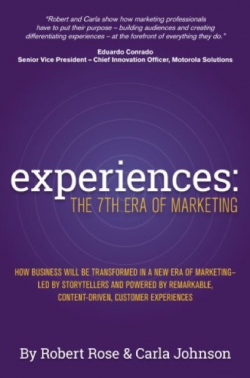I’m guilty. I ran roughshod over the shamans, charlatans and pretenders of content marketing. It was a full-blown rant called ‘The Great Content Marketing Swindle’ aimed directly at service providers and in-house marketers that haven’t been giving their customers a fair deal.
But not every failed project is the result of a swindle. In many cases the brand should accept responsibility for some of the backlash we’re encountering.
Plenty has been written about the dramatic impact of the internet and the corresponding shift in consumer behaviour. If you’re reading this, you understand it too. I won’t belabour the point.
What hasn’t changed, in many ways, is how brands are executing their marketing and advertising programs. If the target audience changes, marketers need to change as well. Here are five things modern marketers should be doing if they want to maintain or grow their current audience.
1. Accept consumers have changed in more ways than one
It’s not just behaviour; what customers value has also changed. While brands have been focused on building relationships for the past 20 years – mostly unsuccessfully – the people we’re trying to reach have abandoned acquiring material possessions in favour of gaining new experiences. They don’t want to accumulate stuff; they want to ‘do’ things. This change is detailed in the book Experiences: The 7th Era of Marketing by Robert Rose and Carla Johnson.

If your business is still chasing relationships, you’re already in trouble. The book cites multiple statistics and gives anecdotal evidence to prove consumers aren’t interested in getting friendly with a brand. They’re less loyal than ever despite a concentrated effort from brands to form relationships on social media and develop customer loyalty programs.
[tweet] If your business is still chasing relationships as your marketing strategy, you’re already in trouble, says @SarahMitchellOz. [/tweet]
This is particularly true when marketing to Gen Y. Listen to Charlie Caruso, a Gen Y expert, address this issue in episode 38 of the Brand Newsroom podcast.
2. Tell better stories
The subtitle of Rose and Johnson’s book shows what marketers need to be successful in the future. How Business Will be Transformed In a New Era of Marketing Led by Storytellers and Powered by Remarkable, Content-Driven Customer Experiences gives the whole story behind where marketers should be focusing their energy.
If customers value experiences, content is a great way for marketers to provide that experience. Content may be the only real way left for marketers to differentiate themselves.
To create valuable content and great experiences, marketers have to know how to write and how to tell a great story. It also means they have to get on board with content marketing. The days of printing a brochure or throwing a static website together are over if you intend to be a successful marketer. Content marketing is not being taught in universities, so it’s the responsibility of each marketing manager to take the initiative and re-skill.

Attending Content Marketing World is a great way to start down a new skill path. Put it in your budget for next year; you won’t be sorry.
For something a little closer to home, why not enrol in my Masterclass on writing? It’s a half-day workshop designed to improve writers of every level and get them telling better stories.
3. Start with a long-term strategy
Content marketing is a broad discipline with many different facets, all required to work in unison. It’s no wonder many marketing managers have resisted or been confused about what and how they should be approaching it. Without doubt, a content marketing strategy is essential for success. Research bears this out time and again no matter who is conducting it.
But here’s the problem. Marketing managers continually insist on starting a content marketing initiative before completing the strategy step. They resist taking the time to dig deep into audience behaviours, competitive analysis and channel selection or to develop a sound messaging framework. Taking a dabble approach to content marketing won’t work. Neither will jumping straight into an execution phase.
FURTHER READING: 6 content marketing strategy research tools you need
4. Adopt an engineering mindset
In an interview with August, I said perseverance is one of the big challenges of content marketing. Marketers are often advised to adopt a publishing mindset, but I think you need more than that. You need an engineering mindset.

Engineers build things they know won’t be operational for years and years. Software developers are the same. It’s not unusual for a project to take three or more years before it launches. Marketers need to start looking at their content initiatives this way. Only when you take a long-term view can you begin to build long-term assets.
Traditional marketing tends to be focused on short-term campaigns. The results are often hard to attribute and are focused on metrics like circulation numbers or how many people attended an event. It’s often not viewed as a strategic part of the business and almost always suffers budget cuts before other areas of the business. This is largely because the goals are short-term and results are hard to measure.
Modern marketing is hard. It requires a comprehensive strategy. It takes time to see results and a return on your investment. It relies on a combination of art and science. Measuring and reporting is much more accurate, especially if you’re publishing online. When using an engineering mindset over a long period of time, you can build assets for your company. This helps make modern marketers an important part of overall business strategy.
5. Find the right people to help you
Too many people are saying they’re offering content marketing services when they don’t. This is a problem because they usually have experience doing a small part of content marketing like social media, search engine optimization (SEO), PR or email marketing. They leverage long-term business relationships with a new offering consisting of the old service with a different name. It’s an easy decision for marketing executives to make, especially if you’ve had good success with the agency in the past.
FURTHER READING: An essential guide to content marketing success
Using your regular marketing providers doesn’t work for content marketing. The only way it does is when your agency or service provider has invested substantial time and resources in becoming truly proficient at developing and executing content marketing strategies. It’s not an overnight undertaking; it should take many months and a significant investment in retraining and new staffing.
It’s also worth noting most agencies can’t provide all parts of content marketing. They might be good at one or more things including strategy, content creation, video production, social media, SEO, etc. Take a look at your current suppliers and determine where they can help and where you need to find new service providers. It might mean hiring new staff, working with freelancers or bringing in one or more new agencies.
What modern marketers need to do next
It’s time for marketing professionals to realise they’re now working in a different industry than before – one that requires more skills, more perseverance and a more strategic approach to long-term goals. Focusing on how to deliver a better customer experience with consistently good content is much harder, but it also provides the ability to move your marketing expense into an investment in long-term business assets. Modern marketers up to the challenge of content marketing will differentiate their business from their competition.
Content marketing is hard but you don’t have to go it alone. Contact us if you’d like help with a content marketing strategy or creating content. We have an award-winning team of people with diverse skills and a penchant for great storytelling.
